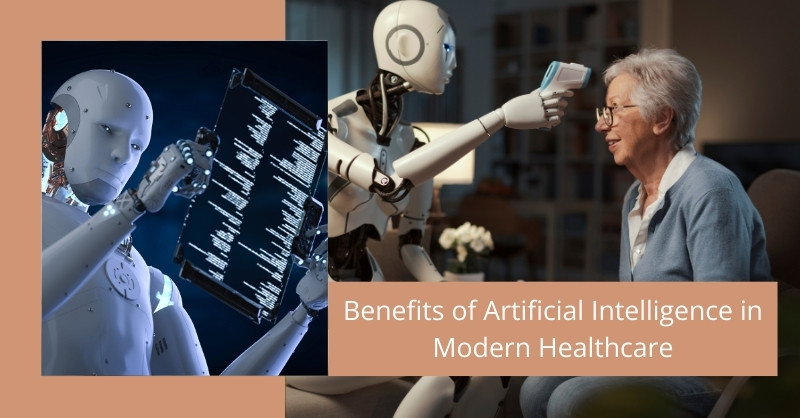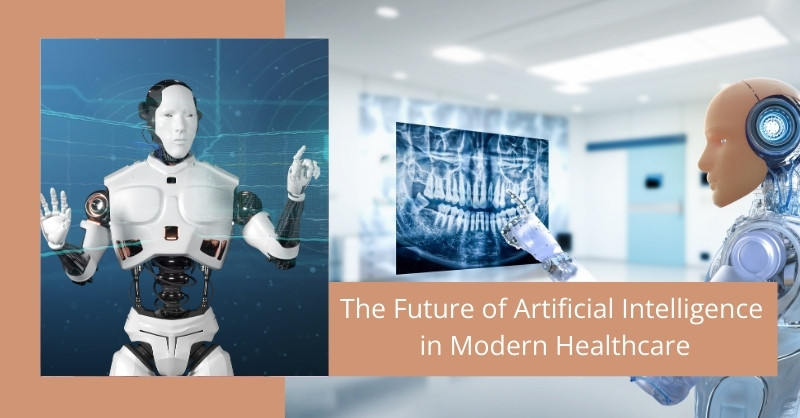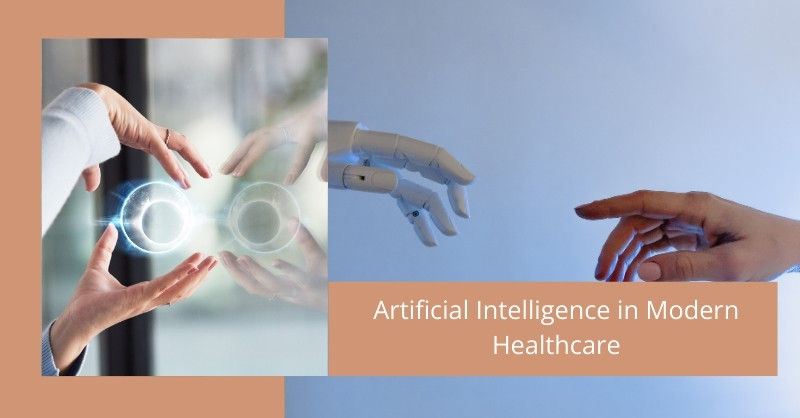Understanding Artificial Intelligence in Modern Healthcare
Artificial Intelligence in Modern Healthcare has rapidly evolved over the past decade, bringing transformative changes to the healthcare industry. AI, a branch of computer science focused on creating intelligent systems, is increasingly being adopted to improve efficiency, accuracy, and accessibility in medical care. From predictive analytics to advanced diagnostics, Artificial Intelligence in Modern Healthcare is reshaping patient outcomes and enhancing the decision-making process for healthcare professionals.
With the growing complexity of medical data, AI-driven systems analyze and interpret information quickly and accurately. These systems are designed to learn from data, adapt to new information, and provide actionable insights that help healthcare providers deliver personalized and effective treatments.
Applications of Artificial Intelligence in Modern Healthcare
The applications of Artificial Intelligence in Healthcare are vast and diverse, addressing multiple areas of medical practice and research.
AI in Medical Diagnosis
AI algorithms are revolutionizing medical diagnosis by identifying patterns in patient data that may not be immediately apparent to human practitioners. Machine learning models are particularly effective in diagnosing conditions like cancer, cardiovascular diseases, and neurological disorders. For example, AI-powered tools can analyze mammograms to detect early signs of breast cancer with high accuracy, reducing the likelihood of false positives and negatives.
AI in Drug Discovery
Artificial Intelligence in Modern Healthcare is streamlining the drug discovery process by predicting how different compounds will interact with biological systems. This capability accelerates the development of new medications and reduces the time and cost associated with traditional methods. Pharmaceutical companies are increasingly leveraging AI to identify promising drug candidates, optimize clinical trial designs, and predict potential side effects.
AI in Medical Imaging
AI technologies are enhancing the field of medical imaging by improving the accuracy and efficiency of diagnostic procedures. AI-powered systems can process and interpret medical images such as X-rays, MRIs, and CT scans, identifying abnormalities that may be missed by the human eye. These advancements are particularly valuable in radiology, where timely and accurate diagnoses are critical.
AI in Personalized Medicine
One of the most promising applications of Artificial Intelligence in Modern Healthcare is personalized medicine. By analyzing genetic, environmental, and lifestyle data, AI systems can tailor treatments to individual patients. This approach not only improves the effectiveness of therapies but also minimizes the risk of adverse reactions. For instance, AI can help oncologists determine the most effective chemotherapy regimen based on a patient’s unique genetic profile.
Benefits of Artificial Intelligence in Modern Healthcare

The integration of Artificial Intelligence in Modern Healthcare offers numerous benefits for both patients and healthcare providers:
- Improved Diagnostic Accuracy: AI systems can analyze vast amounts of data to detect diseases at early stages, leading to better patient outcomes.
- Enhanced Efficiency: Automation of routine tasks allows healthcare professionals to focus on more complex and critical aspects of patient care.
- Cost Savings: AI-driven tools reduce operational costs by streamlining processes such as billing, scheduling, and inventory management.
- Personalized Treatments: AI enables the development of customized treatment plans that address the specific needs of individual patients.
- Improved Accessibility: AI-powered telemedicine platforms make healthcare services more accessible to patients in remote or underserved areas.
Challenges of Artificial Intelligence in Modern Healthcare
While the benefits of Artificial Intelligence in Modern Healthcare are undeniable, its adoption is not without challenges. These include:
- Data Privacy and Security: The use of AI in healthcare involves the collection and analysis of sensitive patient data, raising concerns about privacy and cybersecurity.
- High Implementation Costs: Developing and deploying AI systems require significant financial investment, which may be prohibitive for smaller healthcare providers.
- Ethical Considerations: The use of AI in decision-making raises ethical questions about accountability, bias, and transparency.
- Lack of Standardization: The absence of standardized protocols for AI systems can lead to inconsistencies in performance and outcomes.
- Resistance to Change: Healthcare professionals may be hesitant to adopt AI technologies due to concerns about job displacement and the reliability of AI-driven decisions.
The Future of Artificial Intelligence in Modern Healthcare

The future of Artificial Intelligence in Modern Healthcare is incredibly promising, with ongoing advancements expected to revolutionize the industry further. Key trends include:
AI in Preventive Medicine
AI systems increasingly predict and prevent diseases before they occur. By analyzing data from wearable devices and electronic health records, AI identifies risk factors and recommends preventive measures, enabling early intervention and improved health outcomes.
AI Healthcare Innovations in 2025
The year 2025 is expected to witness significant advancements in AI-powered healthcare technologies. These include the development of intelligent chatbots for patient engagement, AI-driven robotic surgery systems, and advanced predictive analytics for population health management.
Role of AI in Global Healthcare
Artificial Intelligence in Modern Healthcare is poised to address global health challenges by improving access to medical services in underserved regions. AI-powered telemedicine platforms and mobile health applications are bridging the gap between patients and providers, ensuring equitable access to quality care.
Ethical and Regulatory Developments
As AI continues to evolve, regulatory bodies are working to establish guidelines that ensure the ethical use of AI in healthcare. These efforts aim to promote transparency, accountability, and fairness in AI-driven systems.
Preparing for Artificial Intelligence in Modern Healthcare
Both patients and healthcare professionals must take proactive steps to prepare for the widespread adoption of AI technologies. Here are some recommendations:
- Stay Informed: Keep up-to-date with the latest developments in AI and healthcare by following reputable sources and attending industry conferences.
- Invest in Education: Healthcare professionals should pursue training programs to gain expertise in AI technologies and their applications.
- Foster Collaboration: Encourage collaboration between technologists, healthcare providers, and policymakers to address challenges and unlock the full potential of AI in healthcare.
- Advocate for Ethical Practices: Support initiatives that promote the ethical use of AI in healthcare, ensuring that patient rights and well-being remain a top priority.
Conclusion
Artificial Intelligence in Modern Healthcare is a transformative force that holds immense potential to revolutionize the medical field. From improving diagnostic accuracy and accelerating drug discovery to enabling personalized treatments and enhancing global healthcare accessibility, AI is reshaping the way we approach medical challenges. However, the successful integration of AI requires addressing challenges such as data privacy, ethical considerations, and implementation costs.
Looking to the future, collaboration among technologists, healthcare professionals, and policymakers will be critical to harnessing the full potential of AI while ensuring its ethical and equitable use. By staying informed, embracing innovation, and advocating for responsible practices, we can pave the way for a healthcare system that leverages AI to improve lives globally.
Read this Article: 👉 Tips to Avoid a Heart Attack: Reduce Your Risk and Live a Longer, Healthier Life
Read this Article: 👉 Obesity-Related Health Problems: Understanding the Impact and Solutions



